2020 浙江杭州师范大学英语文学基础考研真题
Part I Each of the statements below is followed by four alternative answers. Choose
the one that would best complete the statement. (20x2)
1.
About the Renaissance humanists which of the following statements is true?
A. They thought money and social status was the measure of all things.
B. They emphasized the dignity of human beings and the importance of the worldly
life.
C. They couldn't see the importance of worldly happiness.
D. They thought people were largely subordinated to the ruling class without any
freedom
and independence.
2.
Which of the following is not John Milton’s works?
A. Paradise Lost
B. Paradise Regained
C. Samson Agonistes
D. The
Pilgrim’s Progress
3.
the vices of his age.
Jonathan Swift’s Gulliver’s Travels gives an unparalleled_____ depiction of
A. religious
B. romantic
C. satirical
D. comic
William Blake’s Songs of Experience paints a world of _____ with a melancholy
4.
tone.
A. misery, poverty, disease, war and repression
B. happiness and love and romantic ideals
C. misery, poverty mixed with love and happiness
D. loss and institutional cruelty with sufferings
5.
Through his poems, Byron created the “Byronic hero” who is _____.
A. a brave and stubborn rebel figure of noble origin
B. a proud, mysterious rebel figure of noble origin
C. a proud, mysterious rebel figure of lower origin
D. a brilliant, independent and romantic figure of his time
Which of the following can’t be included in the critical realists of the
6.
Victorian Period?
A. Charlotte and Emily Bronte
B. Charles Dickens and William M. Thackeray
C. Thomas Hardy and George Eliot
D. D. H. Laurence and James Joyce
7. “Ode on a Grecian Urn” shows the contrast between the______ of art and the____
of human passion.
A. glory,ugliness
C. transience,sordidness
8.
century writers who wrote under the influence of _____.
The term “metaphysical poetry” is commonly used to name the work of the 17th
B. permanence, transience
D. glory,permanence
A. John Milton
B. John Donne
C. John Keats
D. John Bunyan
9.
In The Pilgrim’s Progress Christian and Faithful come to the ______where both
�
are arrested as alien agitators and tried.
A. Vanity Fair
C. Celestial City
10. Of the following poets, who is not regarded as “lake poet”?
D. The Valley of Humiliation
B. Doubting Castle
A. Samuel Taylor Coleridge
B. Robert Southey
C. William Wordsworth
D.
B. Endymion
C. Joan of Arc
D. Frankenstein
B. reason
C. individualism
John Keats
11. ________, a Gothic novel written by Mary Shelley, is one of the triumphs of the
Romantic movement due to its theme of alienation and its warning about the
destructive power that can result when human activity is unfettered by moral and
social concerns.
A. Waverley
12. Which of the following statements about the Romantic period in the history of
American literature is NOT true?
A. Most heroes and heroines in the writings of this period exhibited extremes of
reason and rationality.
B. In most of the writings of this period there was a new emphasis upon the imaginative
and emotional qualities of literature.
C. There were a strong tendency to exalt the individual and the common man.
D. The writers of this period placed an increasing emphasis on the free expression
of emotions and displayed an increasing attention to the psychic states of their
characters.
13. The common thread throughout American literature has been the emphasis on the___.
A. revolutionism
14. Although realism and naturalism were products of the 19th century, their final
triumph came in the 20th century, with the popular and critical successes of such
writers as Edwin Arlington, William Cather, Robert Frost, William Faulkner and_____.
A. Edgar Allan Poe
C. Washington Irving
15. ____, one of the essays in The Sacred Wood, is the earliest statement of T.S.
Eliot’s aesthetics, which provided a useful instrument for modern criticism.
A. “Tradition and Individual Talent”
C. “A Primer of Modern Heresy”
16. The three poets Ezra Pound, T.S. Eliot and ____ opened the way to modern poetry.
A. O. Henry
C. E.E. Cummings
17.
A. Jonathan Edwards
18.
A. Walden
19. Which is regarded as the “Declaration of Intellectual Independence” in the
history of American Literature?
A. The American Scholar
C. The Conduct of Life
20. Imagism was equivalent to ___ in fiction in a sense. Imagist never stated the
D. Thomas Hooker
Which is generally regarded as the Bible of New England Transcendentalism?
Which writer best expressed the Puritan sense of the self?
B. Henry David Thoreau
D. Robert Frost
B. Cotton Mather
C. John Smith
B. “Sweeny Agonistes”
B. Nature
C. “On Beauty”
D. “Self-Reliance”
B. Sherwood Anderson
D. Ralph Ellison
D. rationalism
D. “Gerention”
B. English Traits
D. Representative Men
�
emotion in the poem, but just presented an image: concrete, firm and definite in
picture.
A. modernism
B. romanticism
C. naturalism
D. surrealism
Part II Identify the source of each of the following quotation and write out the
TITLE of which the passage comes from.(20x1)
Whan Zephirus eek with his sweete breeth/Inspired hath in every holt and
All is not lost-----the unconquerable will,/ And study of revenge, immoral
These people are most excellent mathematicians, and arrived to a great
True wit is Nature to advantage dressed,/What oft was thought, but ne’er so
As fair art thou, my bonnie lass,/So deep in luve am I;/ And I will luve thee
If they be two, they are two so/As stiff twin compasses are two:/Thy soul, the
1.
heeth/The tender croppes, and the Yonge sonne/Hath in the Ram his half coursy ronne,
2.
The quality of mercy is not strained;/It droppeth as the gentle rain from heaven/
Upon the place beneath. It is twice blest:
3.
fixed foot, makes no show/To move, but doth if th’other do;
4.
hate,/And courage never to submit or yield:
5.
perfection in mechanics by the countenance and encouragement of the Emperor, who
is a renowned patron of learning.
6.
well expressed;
7.
So here have I lived above sixteen years in virtue and reputation; and all at
once, when I come to know what is good, and what is evil, I must renounce all the
good, all the whole sixteen years’ innocence, which, next to God’s grace, I owed
chiefly to my parents and to my lady’s lessons and example.
8.
still, my dear,/ Till a’ the seas gang dry.
9.
in some shady haunt,/ Among Arabian sands:
10. It is a truth universally acknowledged, that a single man in possession of a
good fortune must be in want of a wife.
11. Wild Spirit, which art moving everywhere;/ Destroyer and Preserver; hear, O
hear!
12. He listened. The wind, playing upon the edifice, produced a booming tune, like
the note of some gigantic harp.
13. What a handsome little Oriental he was, and no doubt his wife and children were
beautiful too, for people usually get what they already possess.
14. This train of thought, she perceives, is threatening mere waste of energy, even
some collision with reality, for who will ever be able to lift a finger against
Whitaker’s Table of Precedency?
15. He hated her bitterly at that moment because he made her suffer. Love her! She
knew he loved her. He really belonged to her. This about not loving her, physically,
bodily, was a mere perversity on his part.
16. They were all running, all crying out madly. He could hear them crashing in the
undergrowth and on the left was the hot, bright thunder of the fire.
No Nightingale did ever chaunt/ More welcome notes to weary bands/ Of travelers
�
17. “I sometimes have a queer feeling with regard to you-----especially when you
are near me, as now; it is as if I had a string somewhere under my left ribs, tightly
and inextricably knotted to a similar string situated in the corresponding quarter
of your little frame.”
18. This grew; I gave commands;/ Then all smiles stopped together.
19. Although schoolmistresses’ letters are to be trusted no more nor less than
churchyard epitaphs; yet, as it sometimes happens that a person departs this life,
who is really deserving of all praises the stone-cutter carves over his bones;
20. Yet all experience is an arch wherethrough/ Gleams that untraveled world whose
margin fades/ Forever and forever when I move.
Part III In this part, you are free to choose Any TWO of the following three literary
terms, and define them. (20x2)
1. Stream of consciousness
2. Conceit
3.Transcendentalism
In 1954, William Golding(1911-1993) published his first novel Lord of the Flies
Part IV. Choose ONE of the two topics and elaborate your views. (25x1)
1.
after nearly 21 rejections of various publishers. This fiction,since its publication,
has been considered as a dystopian allegory indicative of vast aspects of the human
condition, in terms of human evil and society.Elaborate your view on this novel.
2.
Eugene O’Neill(1888-1953) was the first American dramatist to regard the stage
as a literary medium and the only American playwright ever to receive the Nobel Prize
for Literature. Through his efforts, the American theatre grew up during the 1920s,
developing into a cultural medium that could take its place with the best in American
fiction, painting, and music.
Elaborate your view on his works.
Poetry, as we have since learnt, has other tasks than that of imparting
Part V. Read the following two commentaries carefully and choose ONE topic to write
out your own ideas in any relationship to the passage. (25x1)
1.
psychological values to the visible world. Had Wordsworth turned his attention
toward these, his genius might not have atrophied so soon. It remains to indicate
briefly, in conclusion, what gave Wordsworth his initial direction towards
“Nature” as the inevitable raw material for his creative sensibility. Here we met,
I think, with two other groups of beliefs current in his age, which may be said to
have conditioned his poetic experience: postulates (‘doctrines-felt-as-facts’)
without which his poetry would not have been what it actually is. The first was the
product of the deistic tradition of the seventeenth and eighteenth centuries, to
which I have already alluded in passing. Ever since the Renaissance the Creation
had been steadily gaining in prestige as the ‘art of God,’ the universal divine
Scripture which ‘liesexpans’d unto the eyes of all.’ The emotion of the
‘numinous,’ formerly associated with super-nature, had become attached to Nature
�
itself; and by the end of the eighteenth century the divinity, the sacredness of
nature was, to those affected by this tradition, almost a first datum of
consciousness. Wordsworth, then, did not have to construct this belief wholly out
of his experience; much of it was given to him. Much the same is true of the second
of these fundamental beliefs, the belief in the grandeur and dignity of man, and
the holiness of the heart’s affections. This, too, was the products of forces
originating (for our purposes) in the Renaissance; it had arisen out of the ruins
of the theological view of man. As the ‘Fall’ receded further and further into
the region of fable, man was increasingly regarded as a creature not only made in,
but retaining, God’s image; and Wordsworth could acknowledge, without misgiving,
‘a grandeur in the beatings of the heart,’ and speak in good faith of ‘man and
his noble nature.’ In Wordsworth’s lifetime this humanism had taken a colouring
from Rousseau, and the special nobility of man was therefore only to be looked for
‘in huts where poor men lie.’ The ‘higher’ grades of society, in which the culture
of the Renaissance had been exclusively fostered, were now “A light, a cruel, and
vain world, cut off/From the natural inlets of just sentiment,/From lowly sympathy,
and chastening truth.”
[From “On Wordsworth and the Locke Tradition” by Basil
Willey]
2.
Poetic influence is a labyrinthine process, and at its deepest is remote from
echo and allusion, though it does not exclude them…When Whitman tallies he takes
measures of all things, implicitly including the measure of his own poetry. In his
very different way, Whitman is as formalist a poet as were our late contemporaries
James Merrill and Anthony Hecht, who usefully may be contrasted to the late A. R.
Ammons and to John Ashbery, both of them strongly influenced by the poet of Leaves
of Grass. Ammons and the versatile Ashbery can be far freer in form than Whitman
ever is. The King James Bible is the largest influence upon Whitman’s style, and
the Hebrew parallelism breaks through in the strongest of the translators, William
Tyndale and Miles Coverdale. There is no single measure to Whitman’s song, just
as his huge enlargements transcend all previous notions as to what can constitute
materiapoetica. To hold together the vastness of his topics and the fluid dissolves
of his tropes Whitman had to discover a master metaphor and found it in the tally,
at once his ‘confession sprig’ and his incanted warbles for lilac-time. The
Whitmanian tally is the binding agent for “When Lilacs last in the Door-yard
Bloom’d,” the sonorous elegy for the martyred Abraham Lincoln. Together with “As
I Ebb’d with the Ocean of Life,” “Lilacs” is the most formally measured of
Whitman’s peoms. I have a passion for “Lilacs,” though the epic “Song of Myself”
is certainly the center of the Whitmanian poetic cosmos. Henry and William James,
T. S. Eliot(belatedly), and Wallace Stevens all associated “Out of the Cradle
Endlessly Rocking” with “Lilacs” because there is a clear affinity between the
mockingbird’s song and the song of death warbled by the hermit thrush. The boy
Whitman first beholds the mockingbird “when the lilac-scent was in the air.” The
crucial difference between “Out of Cradle” and “Lilacs” seems to me that the
sea in the first poem lisps the low and delicious word death, which becomes the burden
of hermit thrush’s song in “Lilacs.” In the earlier poems, the male mockingbird
�
sings of bereavement but not of death, though that is implied. Why did Whitman choose
the word tally for what I judge to be his comprehensive vision of poetic voice? The
word has a curious history. It derives from the Latin talea, which means a cutting,
rod, or stick, on which you record payments and the sum still owed. In English, it
transmuted into the idea of a duplicate or other half. It then became associated
with illicit love. To live “tally” was to dwell together without marriage. In time
the word expanded to become tally-whacking, tally woman, and tally-wags. [From The
Anatomy of Influence: Literature as a Way of Life by Harold Bloom]
�
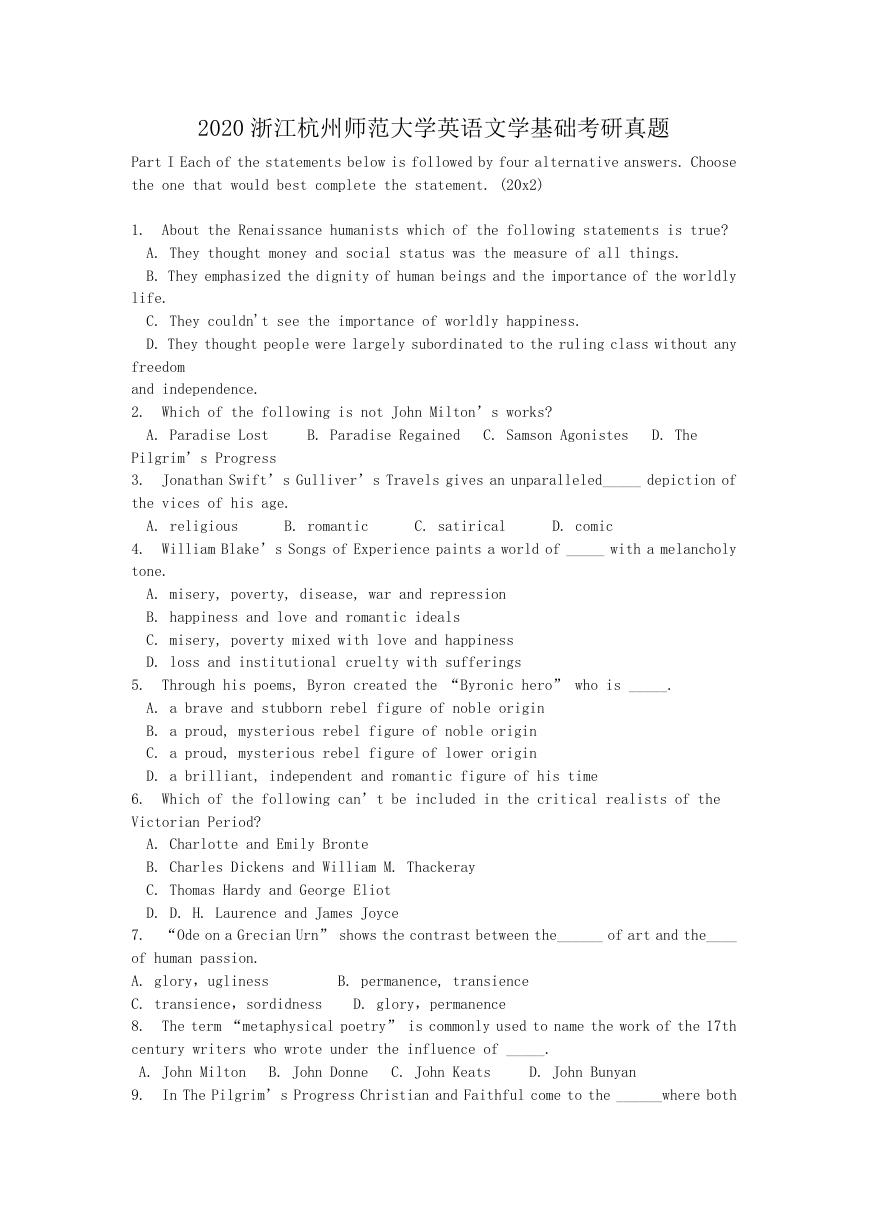
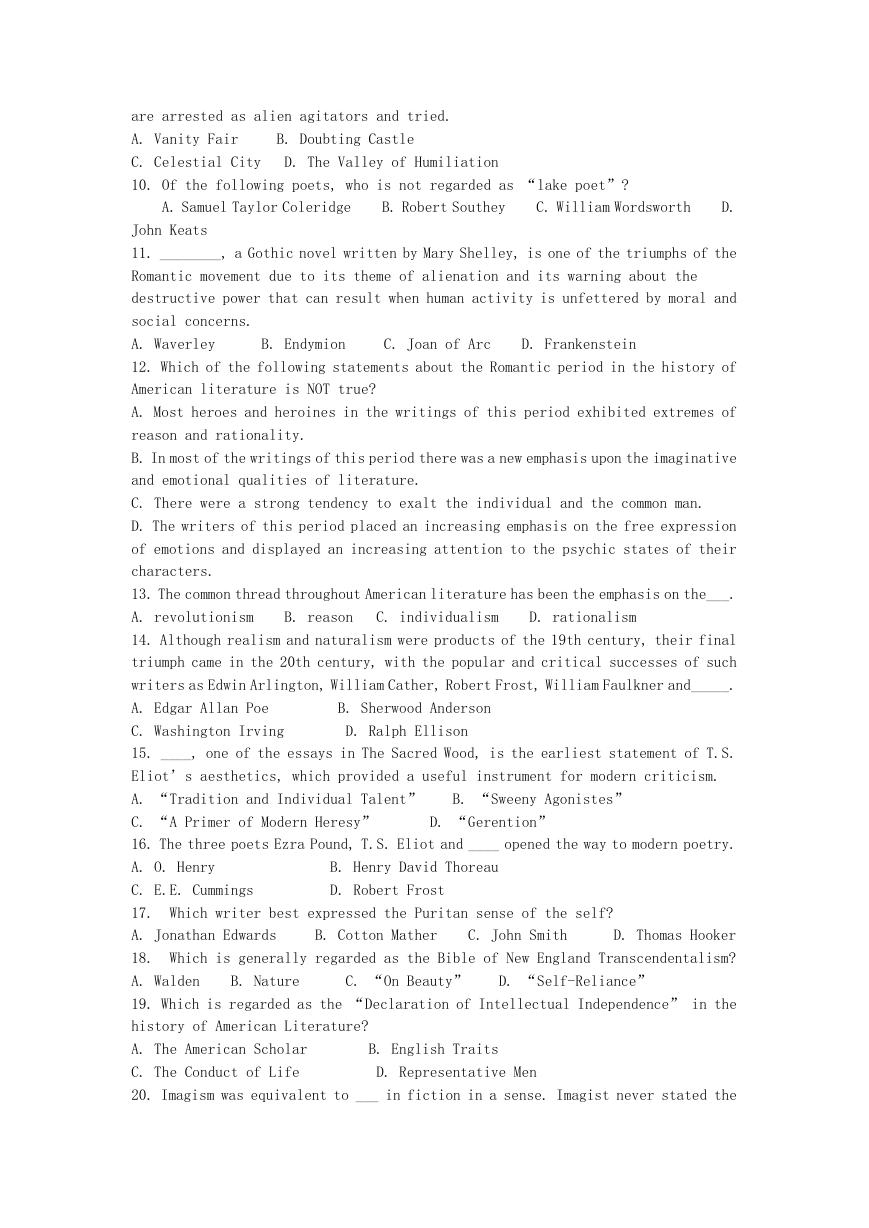
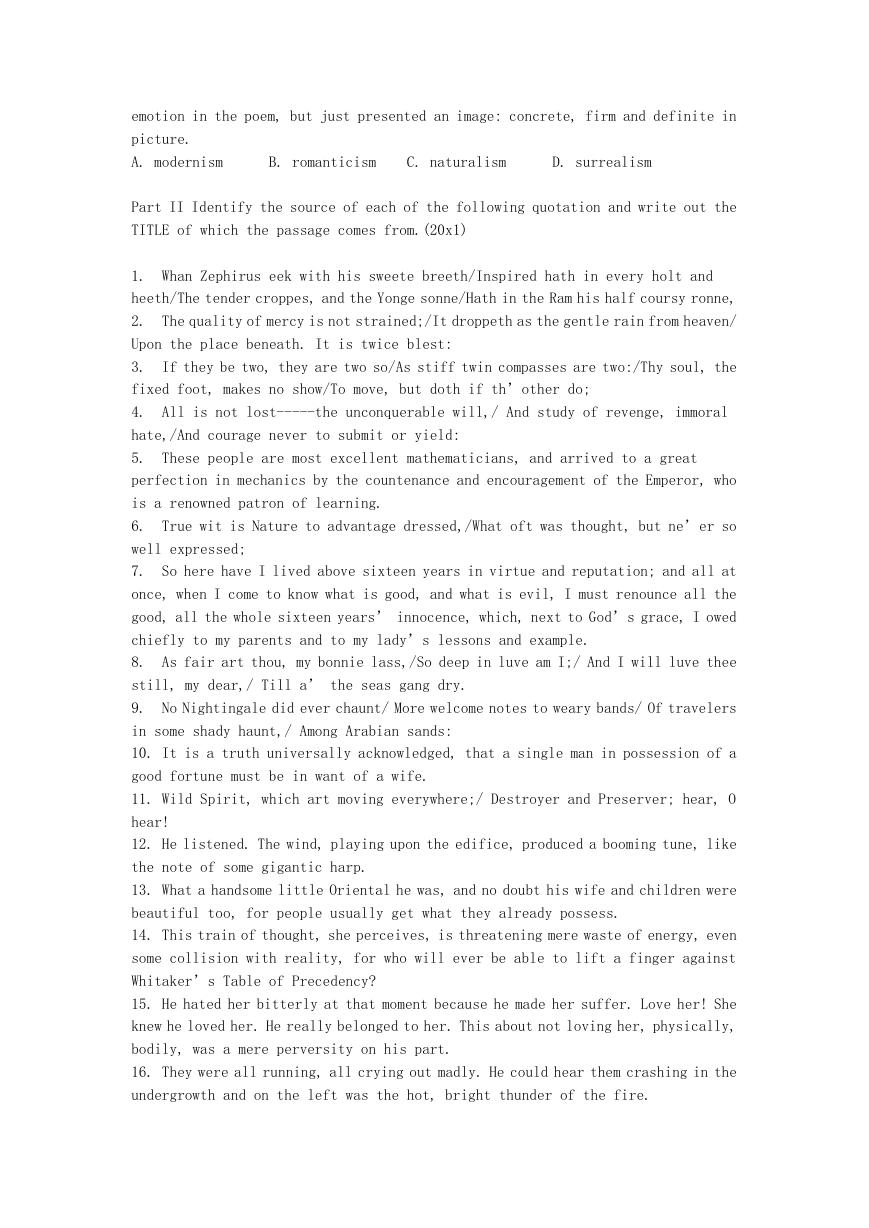
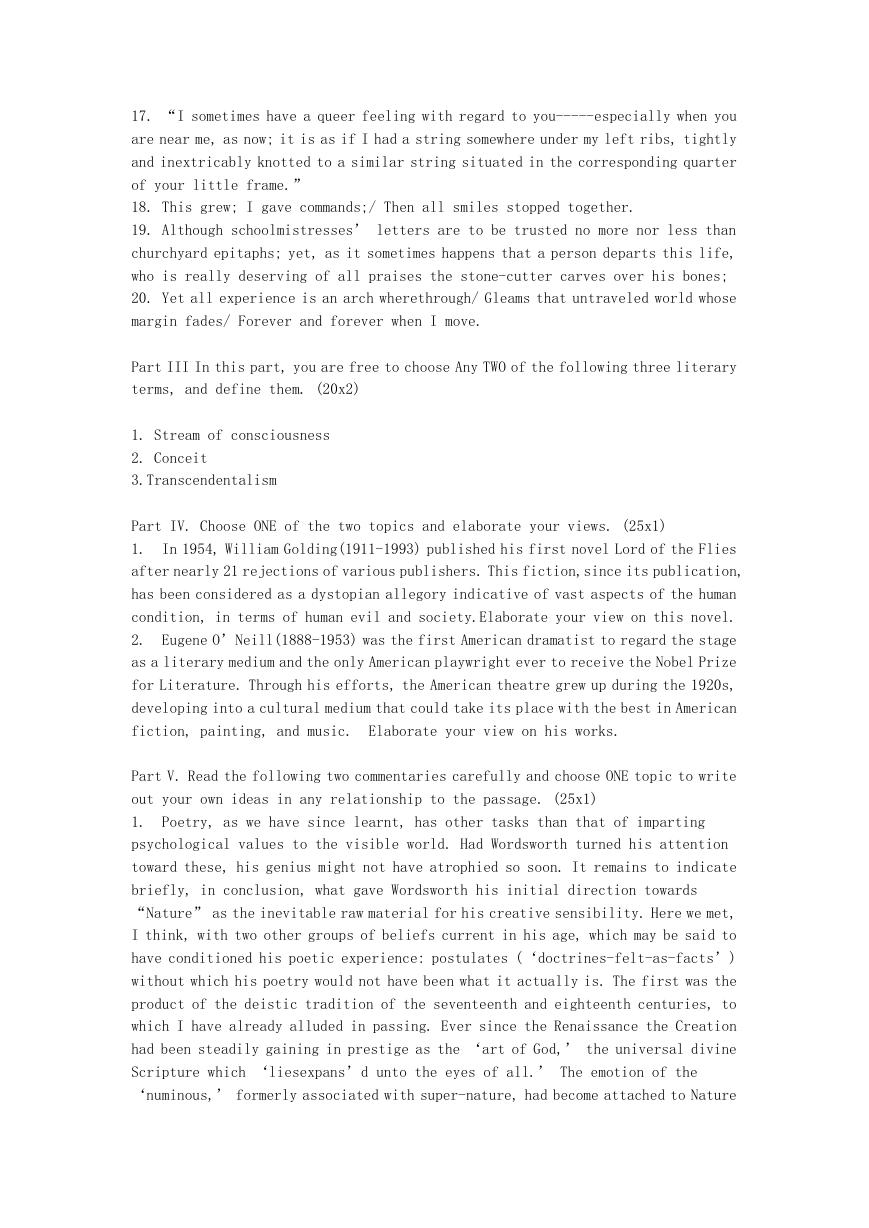
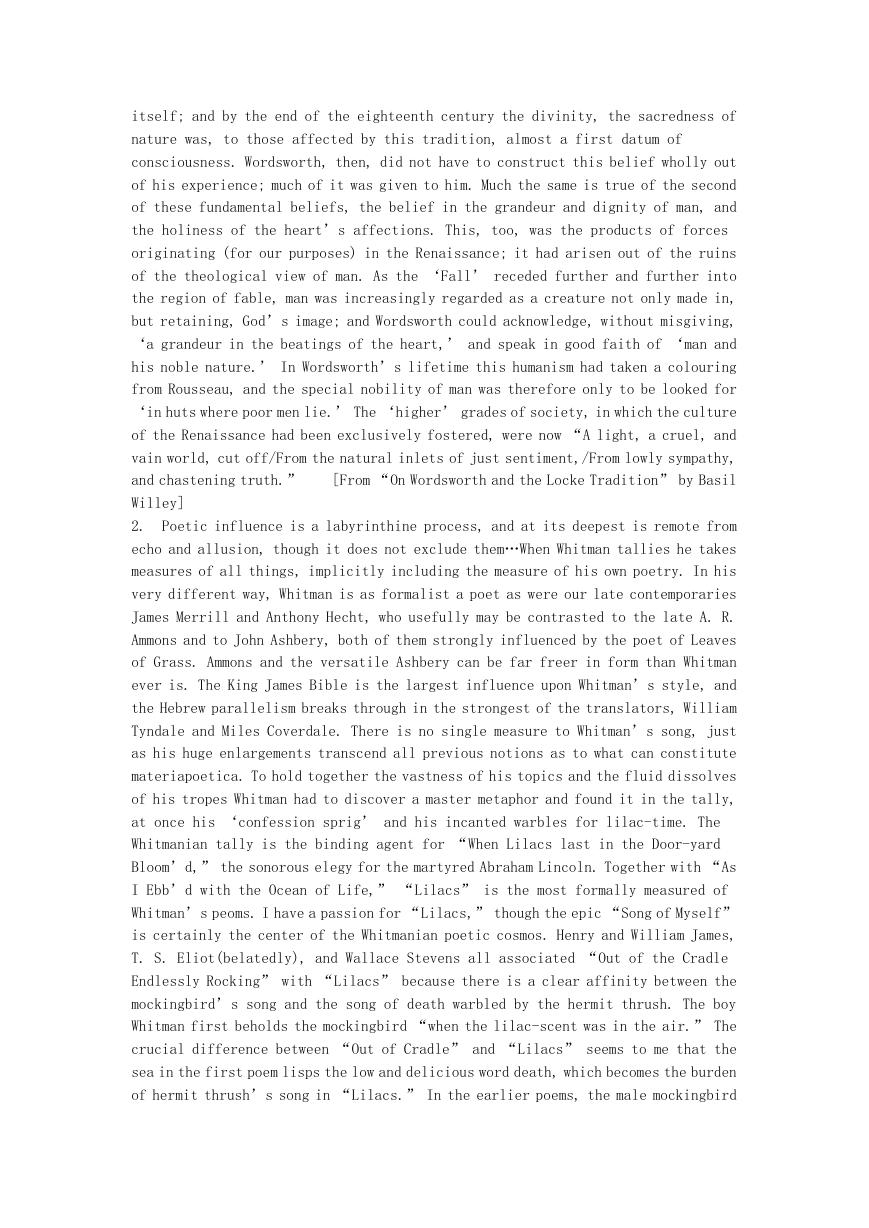
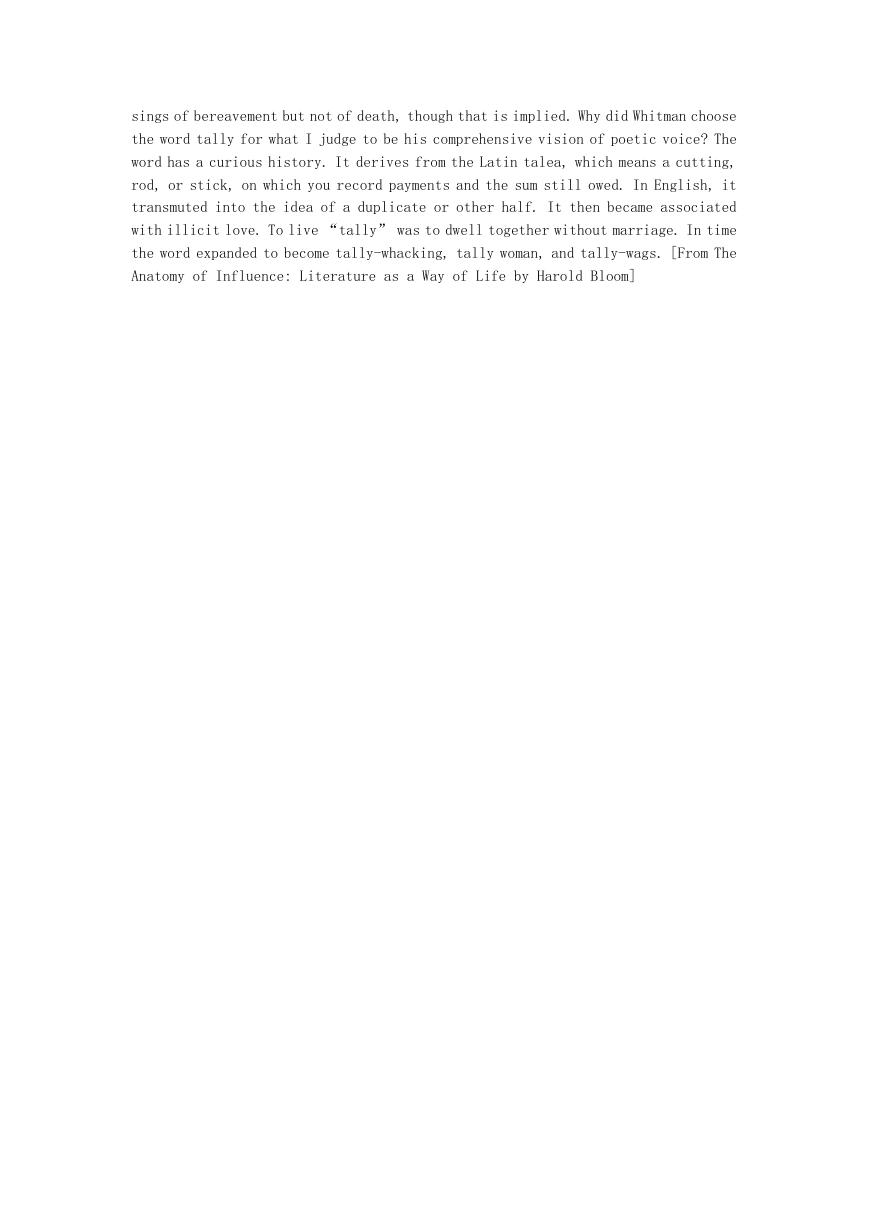






 2023年江西萍乡中考道德与法治真题及答案.doc
2023年江西萍乡中考道德与法治真题及答案.doc 2012年重庆南川中考生物真题及答案.doc
2012年重庆南川中考生物真题及答案.doc 2013年江西师范大学地理学综合及文艺理论基础考研真题.doc
2013年江西师范大学地理学综合及文艺理论基础考研真题.doc 2020年四川甘孜小升初语文真题及答案I卷.doc
2020年四川甘孜小升初语文真题及答案I卷.doc 2020年注册岩土工程师专业基础考试真题及答案.doc
2020年注册岩土工程师专业基础考试真题及答案.doc 2023-2024学年福建省厦门市九年级上学期数学月考试题及答案.doc
2023-2024学年福建省厦门市九年级上学期数学月考试题及答案.doc 2021-2022学年辽宁省沈阳市大东区九年级上学期语文期末试题及答案.doc
2021-2022学年辽宁省沈阳市大东区九年级上学期语文期末试题及答案.doc 2022-2023学年北京东城区初三第一学期物理期末试卷及答案.doc
2022-2023学年北京东城区初三第一学期物理期末试卷及答案.doc 2018上半年江西教师资格初中地理学科知识与教学能力真题及答案.doc
2018上半年江西教师资格初中地理学科知识与教学能力真题及答案.doc 2012年河北国家公务员申论考试真题及答案-省级.doc
2012年河北国家公务员申论考试真题及答案-省级.doc 2020-2021学年江苏省扬州市江都区邵樊片九年级上学期数学第一次质量检测试题及答案.doc
2020-2021学年江苏省扬州市江都区邵樊片九年级上学期数学第一次质量检测试题及答案.doc 2022下半年黑龙江教师资格证中学综合素质真题及答案.doc
2022下半年黑龙江教师资格证中学综合素质真题及答案.doc